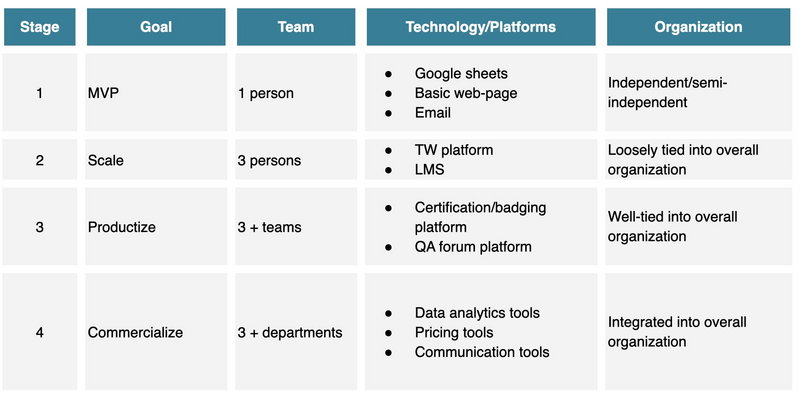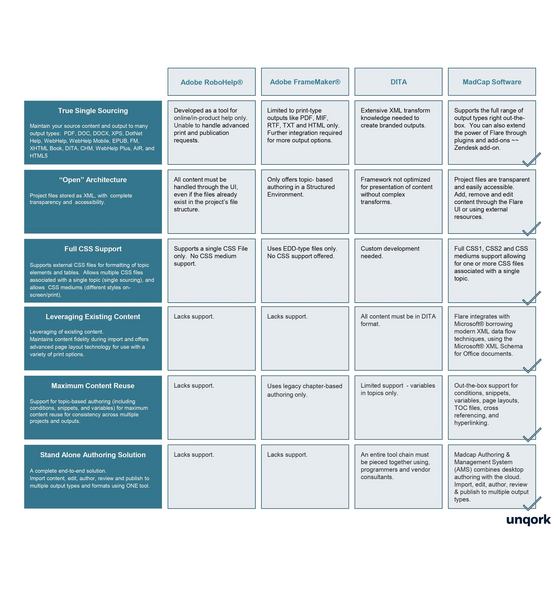Professional Partner Content
Four Stages of Maturity Model for Educational Services
Published Mon Dec 21 2020
At Unqork, we value education. We believe that knowledge, new skills, and unique abilities drive creativity in problem-solving. From the beginning, Unqork’s focus has been on building a robust enablement function that acts as a center of knowledge for our organization. Today, Unqork supports more than 10,000 students engaging in dozens of programs and certifications.
To launch and scale the function quickly, I developed four stages of organizational maturity. Recently, I presented a webinar that focused on those stages and demonstrated how picking the right technology, building the right team, and selecting the right focus areas helped me scale the function in a control fashion.
In this post, I’ll offer more insights into these stages.

Stage 1
Stage 1 is around building out a minimum viable product for your educational offering. At this stage, all you need is to prove that demand exists for your “product.” You’ll need to launch a basic version of your course then present it to a willing audience. If the feedback is positive and you get follow-ups, consider it a win.
The most steps to take during stage 1 are to lose fear and research. If you need a place to start, I recommend checking out the Technology Services Industry Association. This company produces top-notch research for educational services, including benchmarking and best practices.
Stage 2
Stage 2 involves scaling. Since you know that there is a demand for educational services at your company, you need to focus on growing your audience and improving your “product.” This is the right time to start hiring a team. Your team’s most barebones version should consist of you, a technical writer, and a technical trainer. This frees you up to focus on two important decisions that need to be made in stage 2: selecting a learning management system (LMS) and a single-source technical writing platform.
There are hundreds of LMS platforms available on the market, each with unique features. When selecting a platform, I recommend creating a list of requirements and measuring the providers based on how they score against those requirements.
The same process should be done when it comes time to selecting a single-source technical writing platform. We evaluated numerous solutions, including Adobe’s FrameMaker and RoboHelp, and DITA. MadCap Software met all our requirements. Today, our content resides under one umbrella as a single-sourced project from which we pull into different areas: Academy, in-product help, user guides, and more. This extreme organization allows us to scale without running a risk of losing track of versions and creating duplicate content. Picking the right platform was a critical step in our growth process.

Stage 3
Stage 3 is about turning your educational offerings into an actual product. This means that your course (or any content you produce) should be beautiful, well-designed, and easy to consume. One of the key obstacles you will face will be around building the right team. By this point, you should start thinking about creating at least three separate functions: technical writing (to produce the content), instructional design (to design the content), and technical training (to deliver the content).
Stage 4
Stage 4 is all about commercialization. By this time, you should already be running a robust organization. When thinking about whether to make your educational services free of charge or to commercialize your offering, remember two facts:
1. Just because education is offered for free doesn’t mean anyone will consume it.
2. Putting a price tag on educational services makes them seem more valuable to the user.
Industry best practice is to make educational services a revenue-generating function.
About the Author
Olga Gomonova is the head of enablement at Unqork. Prior to joining Unqork, she worked for several Fortune 500 companies including State Street Corporation, McKinsey & Co, and Microsoft Corporation. Olga graduated from Tufts University with a degree in international relations and finance. In 2014, she received an MBA degree from Harvard Business School.


